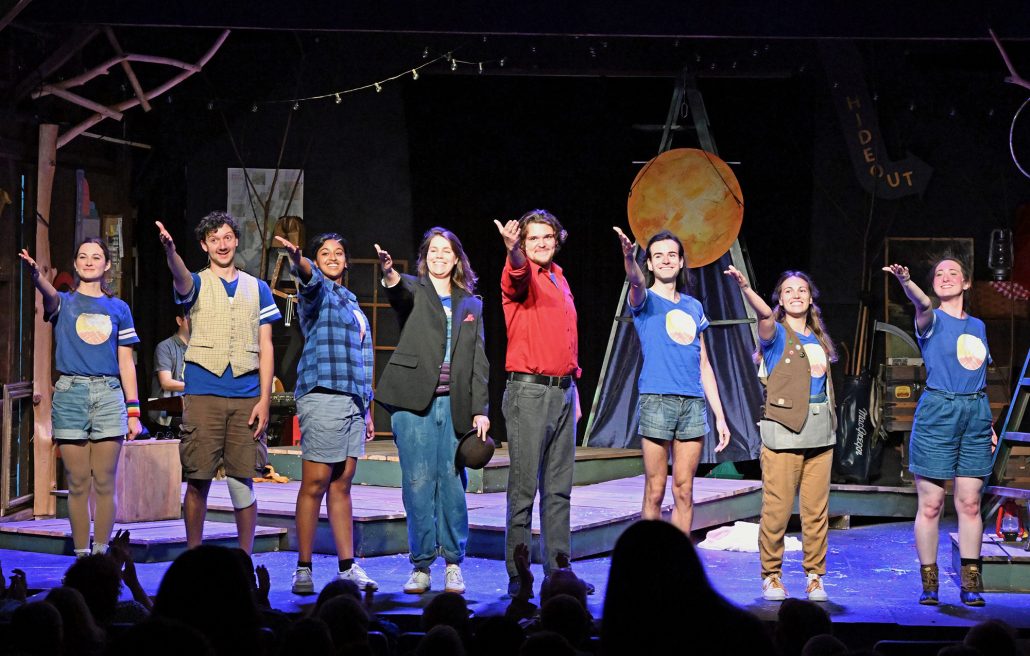
The cast of the Depot Theatre’s production of THE FANTASTICKS (L-R: Cassidy Sledge, Sam Balzac, Isha Narayanan, Amanda Giles, Zach Monczewski, James Rose, Rebecca Lee Whitcomb, Madeline Saintsing.)
THE FANTASTICKS, the comforting theatrical equivalent of ordering the same thing at the restaurant you always do, has not been around forever, although it may seem that way. Debuting in 1960, the musical proceeded to go on an historic, 42-year off-Broadway run, while becoming almost a legal requirement for every high school and community theater in the land. But don’t go to the Depot Theatre’s take on THE FANTASTICKS (running through Aug. 27) expecting the same-ole same-ole.
For the past couple of years directors have been under the hood of THE FANTASTICKS, souping up the old jalopy into a modern-day street rod. It began when New York director Michael Lluberes partnered with the show’s original lyricist Tom Jones to produce a same-sex version, trading in the boy and the girl around which the musical revolves into two young men and swapping out the two chuckleheaded fathers for chuckleheaded mothers.
The Depot’s take is a bit different, with actors across the spectrum of gender expression who step into and assume these historically archetypal roles – that admittedly takes some getting used to – but then as the show progresses creates an entirely new layer of interest for a musical that was in need of one.
The girl, Luisa, is played by James Rose, the boy, Matt, by Isha Narayanan, and they complement each other well, Narayanan in a steady, understated role as the older and (theoretically) wiser half, and Rose as the emotional and flighty Luisa.
The Director allows Rose to dominate that stage, which she does with joyful exuberance. The success of this adaptation largely depends on Rose’s performance, and she delivers.
Backing up the young couple are their fathers, Sam Balzac as the boy’s father Hucklebee, Rebecca Lee Whitcomb as the girl’s father Bellomy. Both are delightful. Hucklebee is an old naval salt with aching joints, a sailor-man that Balzac portrays with a dash of enthusiastic Popeye-like determination and occasional blindness to reality. Interestingly, Whitcomb could just as easily be thought of as a mother, but comes across on stage as a father, an impressive display of ability.
Yet where the gender reversals were most seamless is in crowd favorites Madeline Saintsing and Cassidy Sledge, who play the old actor Henry, and the man who dies, Mortimer. So perfectly do they play these roles that once you’ve seen them, in gender terms, you won’t want to go back.
So too are more traditionally filled roles of El Gallo, played by Zach Monczewski and the mute, played by Amanda Giles. Giles flits about, being everywhere and nowhere, seen and unseen, providing the show with meaningful punctuation marks throughout.
It falls to Monczewski, along with other duties, to deliver a feeling rendition of “Try to Remember,” the musical’s signature tune that essentially is a Cliff’s Notes of the show’s themes, most notably that without darkness there can be no light. Other songs, artfully choreographed and brightly accompanied on the piano by Matt Dolan, might be more fun, but none are as meaningful.
All told, this version of THE FANTASTICKS will certainly be more memorable than the perhaps six or eight others that many theater goers will have experienced. There could have been no concept of this adaptation when the show was being penned more than 60 years ago in the straight-laced, Leave It To Beaver era. Yet the script has easily transferable moments reflective of an evolving culture.
When the actors are at the outset drawing lots from a hat — some thrilled at the luck of the draw, some clearly not — it becomes an apt metaphor for the roles we are assigned at birth and later in life. Some lead to happiness, some to anguish — particularly when these roles are not accepted and welcomed by the arched eyebrow of society.
THE FANTASTICKS notably contains a heaping helping of Shakespearean wordplay, recalling a time when all the actors, regardless of the sex of their characters, were men. So consider how much things have changed in a scant 400 years.
The Depot did not change the original script, although there are flourishes that accentuate the point, from rainbow wristbands to the subtle emphasis on the word pride. It explores a new world while honoring the past, particularly through campy stage accents and clever use of a c. 1970 overhead projector.
As might be expected, a production such as this has some of the rough edges of a prototype. But as it gels, it offers more than a new take on gender issues, it is also a bittersweet examination of age.
Many in the audience will have been born, grown up with and aged along with THE FANTASTICKS. Perhaps the loudest chuckle of the night was in response to a line about someone hitting age 40 being old. THE FANTASTICKS has grown old, but it has retained its value and its ability to freely hand the torch to a new generation of promise and hope. The Depot makes us feel appreciative of things past and optimistic about what is to come. And that’s fantastick.
Tim Rowland contributed this review by the request of, and in collaboration with the Depot Theatre. Rowland is a journalist and New York Times bestselling author, whose humorous commentaries explore an eclectic variety of subject matter, from politics to history to the great outdoors. He and his wife Beth live on the Ausable River in Jay, N.Y.
